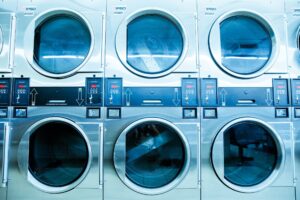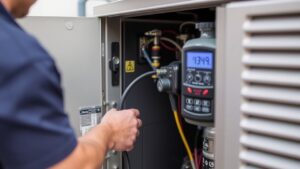Dishwashers have become an essential appliance in many households, making our lives easier by taking care of the tedious task of washing dishes. At the heart of every dishwasher is the motor, which plays a crucial role in the functioning of the appliance. Understanding the role of dishwasher motors is important for homeowners to ensure that their dishwashers are running efficiently and to troubleshoot any issues that may arise.
Key Takeaways
- Dishwasher motors play a crucial role in the functioning of the appliance.
- Common causes of dishwasher motor malfunctions include wear and tear, electrical issues, and clogs.
- Signs of a faulty dishwasher motor include strange noises, failure to start, and poor cleaning performance.
- Troubleshooting techniques for dishwasher motor issues include checking for blockages and testing the motor’s electrical connections.
- Replacing a dishwasher motor can be done as a DIY project, but professional help may be necessary for more complex repairs.
Understanding the Role of Dishwasher Motors
Dishwasher motors are responsible for powering the various components of the dishwasher, such as the spray arms, detergent dispenser, and drain pump. They provide the necessary force to circulate water, spray detergent, and remove dirty water from the dishwasher. Without a properly functioning motor, a dishwasher would be unable to perform its primary function of cleaning dishes effectively.
There are two main types of dishwasher motors: the main wash motor and the circulation pump motor. The main wash motor is responsible for spraying water onto the dishes and agitating them to remove food particles and stains. The circulation pump motor, on the other hand, is responsible for circulating water throughout the dishwasher during different cycles.
Common Causes of Dishwasher Motor Malfunctions
There are several common causes of dishwasher motor malfunctions. One of the most common causes is a clogged or blocked pump or spray arm. Over time, food particles and debris can accumulate in these areas, restricting water flow and causing strain on the motor. Another common cause is a worn-out or faulty motor bearing. This can lead to excessive noise during operation and eventually cause the motor to fail.
Other factors that can contribute to dishwasher motor malfunctions include power surges, electrical issues, and water damage. Power surges can damage the electrical components of the motor, while electrical issues such as loose connections or faulty wiring can prevent the motor from receiving power. Water damage can occur if there is a leak in the dishwasher or if water comes into contact with the motor, leading to corrosion and motor failure.
Signs of a Faulty Dishwasher Motor
There are several signs that indicate a faulty dishwasher motor. One of the most common signs is a dishwasher that is not cleaning dishes properly. If you notice that your dishes are still dirty or have residue on them after a cycle, it could be a sign that the motor is not functioning properly. Another sign is excessive noise during operation. If you hear grinding, buzzing, or squealing noises coming from your dishwasher, it could indicate a problem with the motor.
Other signs of a faulty dishwasher motor include the dishwasher not draining properly, water not spraying evenly, or the dishwasher not starting at all. If you experience any of these issues, it is important to investigate the motor as a potential cause.
Troubleshooting Techniques for Dishwasher Motor Issues
If you suspect that your dishwasher motor is experiencing issues, there are several troubleshooting techniques you can try before calling a professional. The first step is to check for any clogs or blockages in the pump or spray arm. Remove any debris and ensure that water can flow freely through these components.
Next, check the electrical connections to ensure they are secure and free from corrosion. If you suspect an electrical issue, you can use a multimeter to test the voltage at the motor terminals. If there is no voltage present, it may indicate an electrical problem that requires further investigation.
If you have ruled out clogs and electrical issues, it may be necessary to remove the motor for closer inspection. Check for any signs of wear or damage to the motor bearings or other components. If you are unsure how to remove the motor or perform these troubleshooting techniques, it is best to seek professional help.
Replacing a Dishwasher Motor: DIY or Professional Help?

When it comes to replacing a dishwasher motor, homeowners may wonder whether they should attempt the task themselves or seek professional help. There are pros and cons to both options.
One of the main advantages of replacing a dishwasher motor on your own is cost savings. Hiring a professional can be expensive, and if you are confident in your DIY skills, you may be able to save money by doing the job yourself. Additionally, replacing the motor yourself allows you to have more control over the process and ensures that the job is done to your satisfaction.
However, there are also disadvantages to DIY dishwasher motor replacement. It can be a complex task that requires technical knowledge and specialized tools. If you are not experienced in appliance repair, you may risk damaging other components of the dishwasher or installing the new motor incorrectly. Furthermore, if your dishwasher is still under warranty, attempting to replace the motor yourself may void the warranty.
How to Test a Dishwasher Motor for Defects
If you suspect that your dishwasher motor is defective, you can perform a few tests to confirm the issue. Before conducting any tests, make sure to disconnect the dishwasher from power to avoid any electrical hazards.
One way to test a dishwasher motor is by checking for continuity using a multimeter. Set the multimeter to the resistance or ohms setting and touch one probe to each terminal of the motor. If there is no continuity or a very high resistance reading, it indicates a faulty motor that needs to be replaced.
Another test you can perform is a voltage test. With the dishwasher still disconnected from power, set your multimeter to the AC voltage setting and touch one probe to each terminal of the motor. Have someone turn on the dishwasher while you monitor the voltage reading on the multimeter. If there is no voltage present or if it fluctuates significantly, it may indicate an electrical issue that needs further investigation.
Cleaning and Maintaining Your Dishwasher Motor
Proper cleaning and maintenance of your dishwasher motor can help prolong its lifespan and prevent malfunctions. One of the most important maintenance tasks is to regularly clean the pump and spray arm to prevent clogs and blockages. Remove any debris or food particles that may have accumulated in these areas.
It is also important to check the motor bearings for signs of wear or damage. If you notice any grinding or squealing noises coming from the motor, it may indicate that the bearings need to be replaced. Regularly inspecting the motor for any signs of wear or damage can help catch issues early on and prevent further damage.
In addition to cleaning and inspecting the motor, it is important to follow the manufacturer’s guidelines for dishwasher maintenance. This may include regularly cleaning the filter, checking for leaks, and using dishwasher-safe cleaning products. By following these guidelines, you can ensure that your dishwasher motor is running efficiently and prevent unnecessary malfunctions.
Upgrading Your Dishwasher Motor for Better Performance
If you are looking to improve the performance of your dishwasher, upgrading your dishwasher motor may be an option worth considering. Upgrading to a more powerful or efficient motor can result in better cleaning performance and shorter cycle times.
When choosing a new dishwasher motor, it is important to consider factors such as compatibility with your dishwasher model, energy efficiency ratings, and noise levels. Research different motor options and read customer reviews to ensure that you are making an informed decision.
Preventing Dishwasher Motor Malfunctions: Tips and Tricks
Preventive maintenance is key to preventing dishwasher motor malfunctions. Here are some tips and tricks to help keep your dishwasher motor running smoothly:
1. Regularly clean the pump and spray arm to prevent clogs and blockages.
2. Inspect the motor bearings for signs of wear or damage.
3. Follow the manufacturer’s guidelines for dishwasher maintenance.
4. Avoid overloading the dishwasher, as this can put strain on the motor.
5. Use dishwasher-safe cleaning products to prevent damage to the motor.
6. Check for leaks and address them promptly to prevent water damage to the motor.
7. Avoid power surges by using surge protectors or unplugging the dishwasher during electrical storms.
By following these tips and tricks, you can help prevent dishwasher motor malfunctions and ensure that your dishwasher continues to perform at its best.
The Cost of Repairing a Dishwasher Motor: Is it Worth It?
The cost of repairing a dishwasher motor can vary depending on several factors, including the type of motor, the extent of the damage, and whether you choose to hire a professional or do the repair yourself. In general, repairing a dishwasher motor can range from $150 to $500.
When determining whether repairing a dishwasher motor is worth it, it is important to consider the age and condition of your dishwasher. If your dishwasher is relatively new and in good overall condition, it may be worth investing in a motor repair to extend its lifespan. However, if your dishwasher is older or has other significant issues, it may be more cost-effective to replace the entire appliance.
Additionally, if your dishwasher is still under warranty, it is worth checking if the motor repair is covered. Some warranties may cover the cost of parts and labor for motor repairs, saving you money.
Dishwasher motors play a crucial role in the functioning of dishwashers, powering the various components that clean and drain dishes. Understanding the role of dishwasher motors is important for homeowners to troubleshoot any issues that may arise and ensure that their dishwashers are running efficiently.
By following proper cleaning and maintenance techniques, homeowners can prolong the lifespan of their dishwasher motors and prevent malfunctions. Additionally, considering an upgrade to a more powerful or efficient motor can improve the performance of your dishwasher.
While repairing a dishwasher motor can be costly, it may be worth it depending on the age and condition of your dishwasher. Ultimately, proper maintenance and care for dishwasher motors are essential to ensure that your dishwasher continues to perform at its best.
If you’re dealing with dishwasher motor malfunctions, it’s important to know how to identify and fix the issues. However, sometimes the problem may be beyond your expertise or require professional assistance. In such cases, it’s helpful to have a warranty in place to cover any unexpected repair costs. At 911 Appliance Repair, they offer comprehensive warranties for their services. To learn more about their warranty options, check out their warranties page.
How Can Motor Malfunctions Affect My Dishwasher’s Ability to Start?
Motor malfunctions can prevent the dishwasher from starting. When diagnosing dishwasher electrical issues, check for a faulty motor or damaged wiring. Without a functioning motor, the dishwasher’s ability to start and run properly will be greatly affected. Regular maintenance can help prevent these issues from occurring. If the motor is found to be defective, replacing it may be necessary to restore proper function. Additionally, inspecting the wiring for any signs of wear or damage can reveal underlying problems that could lead to the dishwasher not starting. For effective troubleshooting, it’s essential to explore various dishwasher not starting solutions to ensure efficient operation. Additionally, it’s important to ensure that the door latch is secure, as a door that isn’t properly closed may prevent the dishwasher from starting. For those looking for practical advice, there are numerous dishwasher troubleshooting tips available that can assist in identifying and fixing minor issues before they escalate. Regularly checking the power supply and ensuring the circuit breaker is functioning can also help maintain your dishwasher’s reliability.
Table of Contents
- Key Takeaways
- Understanding the Role of Dishwasher Motors
- Common Causes of Dishwasher Motor Malfunctions
- Signs of a Faulty Dishwasher Motor
- Troubleshooting Techniques for Dishwasher Motor Issues
- Replacing a Dishwasher Motor: DIY or Professional Help?
- How to Test a Dishwasher Motor for Defects
- Cleaning and Maintaining Your Dishwasher Motor
- Upgrading Your Dishwasher Motor for Better Performance
- Preventing Dishwasher Motor Malfunctions: Tips and Tricks
- The Cost of Repairing a Dishwasher Motor: Is it Worth It?
- How Can Motor Malfunctions Affect My Dishwasher’s Ability to Start?
- FAQs
- What are some common signs of a malfunctioning dishwasher motor?
- What are some possible causes of a malfunctioning dishwasher motor?
- Can a malfunctioning dishwasher motor be repaired?
- Should I attempt to repair my dishwasher motor myself?
- How much does it cost to repair a dishwasher motor?
- Is it more cost-effective to repair or replace a malfunctioning dishwasher motor?



